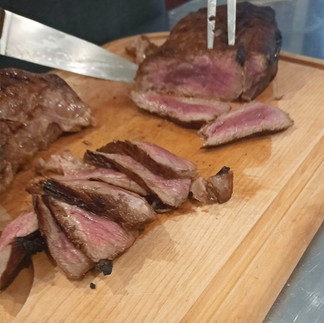The Magic of Marinades
- Tracy Scheckel
- Aug 13, 2025
- 3 min read

I am a big fan of buying large family packages of meat and poultry and then wrapping in dinner-sized portions. It saves some money and gives me the option of grabbing multiple 'dinner packs' when I may be cooking for unexpected guests.
Preparing to Freeze
One time when I was separating a giant package of steak tips, it occurred to me that it might be prudent to make a marinade and pack them in zipper freezer bags right in the marinade. Necessity being the mother of invention; marinating before freezing eliminated the need for me to remember to thaw early enough to accommodate marinating.

The outcome was WAY beyond what I expected! Aside from the convenience and ability to be brain-dead about the thaw time, the flavor and tenderness of the beef was exponentially better than the typical 2-3 hours of marinating time that I would typically allow for. So, we head down the marinade rabbit hole.....
There are four basic components to a simple marinade: salt, oil acid, and flavorings.
The salt - in moderation - helps o draw moisture from the meat and allow the marinade ingredients to permeate.
Oil helps to distribute the flavors of the marinade and help keep the meat from drying out during cooking
Acid helps to breakdown proteins to tenderize and help the meat to absorb the marinade
Flavorings are where you get to create: from sweet to savory to fiery to smokey, your imagination and taste buds are the limit!
AN IMPORTANT NOTE HERE: exercise caution with marinating poultry or fish. Both will have a distinct change in texture with prolonged exposure to acids and salt. (That's how ceviche works) Unless you're looking to 'cook' like ceviche, fish and poultry should not be marinated with acids like vinegar or citrus for more than an hour or two before cooking.
A Parade of Marinades
Marinades are one of those things that I don't measure, I just mix and taste until I'm happy. That said, I do have a couple of tried and true combos that are composed of any number of the ingredients listed in each variety.
Asian: soy or tamari sauce; sesame oil; rice vinegar or wine; onion, garlic, ginger, hot pepper, Asian five-spice, chili crisp
Traditional: sea salt; olive or vegetable oil; dry red wine; onion, garlic, rosemary,cracked pepper, maybe some horseradish
Italian: sea salt; olive oil; red wine, white balsamic, or regular balsamic vinegar; garlic, onion, basil, oregano, herbs de Provence, cracked pepper, maybe capers.
BBQ: sea salt, salt, or tamari; olive or vegetable oil; cider vinegar or bourbon; liquid smoke, brown sugar, honey, maple syrup, molasses, onion, garlic, paprika, chili powder.
Mexican: sea salt; olive or vegetable oil; lime or lemon juice, tequila; cilantro, chili powder, garlic, onion, cumin
For beef or pork, I will do the marinate and freeze thing and make sure I mark the bag with the style of marinade. I use this method on steak tips, London broil, beef or pork stir-fry meat, pork loin and basically any cut of beef that will benefit from a deep marinade. I never mess with beef tenderloin, porterhouse, t-bone etc. -- on the rare occasion that I splurge on these cuts they better not need to be tenderized!
For poultry and fish, I limit the marinate time to a couple of hours, but I have on occasion marinated stir-fry chicken pieces in Asian seasonings but excluded the acidic ingredients.
We like our meat on the rare side of medium, if mine moos when I stab it, I'm good with that. SO, if red meat offends you, scroll up and stop reading. Otherwise, continue to see how the London broil turned out. We certainly enjoyed it with a carpese salad and a scoop of farro salad. (both recipes coming soon!)
One more tip: my herb blends and rubs make the 'flavorings' part of your marinade simple once you decide on the salt, oil and acid elements.











